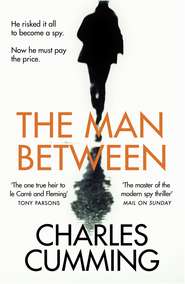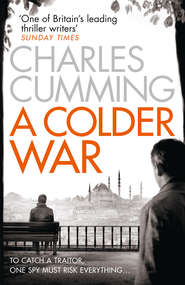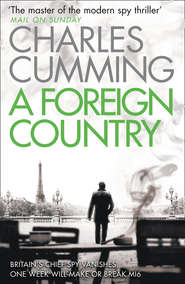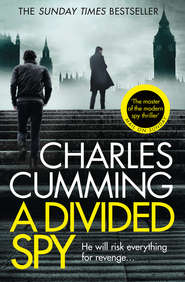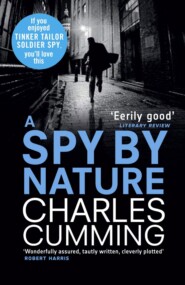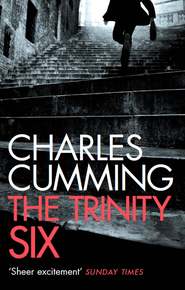По всем вопросам обращайтесь на: info@litportal.ru
(©) 2003-2024.
✖
Alec Milius Spy Series Books 1 and 2: A Spy By Nature, The Spanish Game
Автор
Год написания книги
2019
Настройки чтения
Размер шрифта
Высота строк
Поля
‘God, you make these so good. How’d you know how to do that?’
‘My father taught me.’
She sets the glass on the counter and starts slicing up some tomatoes, a cucumber, and the sticks of celery on a wooden chopping board, throwing them gently into a large teak bowl. Steam has started to rise in thick clouds from the pan on the stove, rattling the lid, but rather than do anything about it, I say, ‘Water’s boiling, Kathy.’
‘You wanna get it, honey? I’m kinda busy.’
‘Sure.’
I remove the lid, twist the dial to low, and watch the water subside into little ripples.
Honey. She called me honey.
Katharine stops chopping and comes to stand beside me. She has a wooden spoon in her hand and says, ‘Let’s put the pasta on, shall we?’
And now very carefully, one by one, she lowers the ravioli pillows into the water on the wooden spoon, intoning, ‘This is the tricky bit, this is the tricky bit,’ in a low voice that is almost a whisper. I am beside her, watching, doing nothing, my shoulder inches from hers. When she is done I walk away from the stove and sit back down on the stool. Katharine brings out a large white plate, a flagon of olive oil, some balsamic vinegar, and a basket of sliced ciabatta. These she places on the counter in front of me. Still clutching the basket, she turns around to face the stove and the silk of her dressing gown rides up to the elbow. Her bared arm is slender and brown, the long fingers of her flushed pink hands crowned by filed white nails.
‘The trick is not to let the water boil too fast,’ she says, talking to the opposite wall. ‘That way the ravioli doesn’t break up.’
She turns back to face me and the sleeve of her gown slips back down her arm. Even with all the flavours and steam around us, the smell of her is lifting from her hair and shower-warmed skin.
‘You’ll love this,’ she says, looking down at the counter. She picks up the flagon of oil and pours it onto the plate in a thin, controlled line that creates a perfect olive circle. Then she allows tiny droplets of balsamic vinegar to fall into the green centre of the plate, forming neat black orbs that float loose in the viscous liquid.
‘Dip the bread in,’ she says, showing me how with a crusty slice of her own. ‘It tastes so good.’
I take a smaller chunk of bread from the basket and run it through the oil.
‘Try to get a little more of the oil than the vinegar,’ she says.
I swirl the bread around and leave cloudy crumbs amid the black and green spirals.
‘Sorry. Messy.’
‘Don’t worry,’ she says, licking her lips. I take my first mouthful, sweet and rich. ‘Tastes good, huh?’
We eat the ravioli sitting at the kitchen table, and consume the better part of a bottle of Chablis by quarter past nine. As Katharine is taking the plates to the sink, the telephone rings and she goes next door to answer it, padding there softly in bare feet. From the tone of the conversation, I presume that it’s Fortner. There’s no forced politeness in Katharine’s voice, just the easy familiarity of long-term couples. At no point does she mention that I am in the next room, though there’s a section of the conversation that I can’t hear owing to a car alarm triggering in Colville Gardens. When it is finally shut off, I overhear Katharine say, ‘You could say that, yes,’ and, ‘Absolutely,’ with a guardedness that leads me to assume they are talking about me. It will be past midnight in Kiev.
‘That was Fort,’ she says, breezing back into the kitchen a few moments later. ‘He says hi. Jesus, those fucking vehicle alarms.’
She wouldn’t ordinarily say ‘fucking’ unless she’d had a few drinks.
‘I know, I heard it.’
‘What’s the point of them, anyway? Nobody pays any attention when they go off. They don’t prevent car crime. Everybody just ignores them. You wanna coffee or something? I’m making myself one.’
‘Instant?’
‘’Fraid so.’
‘No, thanks.’
‘You’re such a snob about coffee, Alec.’
‘Nescafé is just an interestingly flavoured milk drink. You shouldn’t tolerate it. I’m going for a pee, okay?’
‘You do what you have to, sweetie.’
The bathroom is at the far end of the apartment, through the sitting room and down a long corridor that passes the entrance to the flat. The bathroom door is made of light wood with an unoiled hinge that squeaks like a laughing clown when I open it. I walk in and slide the lock. There is a mirror hung above the sink and I check my reflection, seeing tiny pimples dotted along my forehead, which can’t look good in the stark white light of the kitchen. The rest of my face is blanched and I push out my lips and cheeks to bring some colour back into them. Once a little red flush has appeared, I go back outside.
Walking towards the sitting room, I steal a look through the door of their bedroom, which Katharine has left open after her shower. This is the most basic sort of invasion, but it is something I have to do. There are clothes, shoes, and several issues of The New Yorker strewn on the floor. I walk farther inside, my eyes shuttling around the room, taking in every detail. There is a fine charcoal sketch of a naked dancer on the wall above the bed, and a discarded bottle of mineral water by the window.
I go back out into the corridor and hear the distant running of water at the kitchen sink. Katharine is washing up. There is another bedroom farther down on the right side of the passage, again with its door open. Again I look through it as I am passing, prying behind her back. An unmade bed is clearly visible on the far side, with one of Fortner’s trademark blue shirts lying crumpled on the sheets. An American paperback edition of Presumed Innocent has been balanced on the windowsill, and there are bottles of cologne on a dresser near the door. Is it possible that they no longer share a room? There are too many of Fortner’s possessions in here for him simply to have taken an afternoon nap.
I walk quietly back to the first bedroom. This time I notice that the bed has been slept in only on one side. Katharine’s creams and lotions are all here, with skirts and suits on hangers by the door. But there are no male belongings, no ties or shoes. A photograph in a gilt frame by the window shows a middle-aged man on a beach with a face like an old sweater. But there are no pictures of Fortner, no snaps of him arm in arm with his wife. Not even a picture from their wedding.
No noise in the corridor. On a side table I spot a heavy, leather-bound address book and pick it up. The alphabetized guides are curled and darkened with use, each letter covered in a thin film of dirt. I check the As, scanning the names quickly.
AT&T
Atwater, Donald G.
Allison, Peter and Charlotte
Ashwood, Christopher
AM Management
Acorn Alarms
No Allardyce. That’s a good sign.
To B, on to the Cs, then a flick through to R. Sure enough, at the bottom of the third page:
Bar Reggio
Royal Mail
Ricken, Saul
His full address and telephone number are there as well. I have to get back to the kitchen. But there is just time for M.
M&T Communications
Macpherson, Bob and Amy
Maria’s Hair Salon
Milius, Alec






